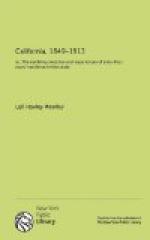In 1850 I was in San Francisco and by chance was on Clay street where the city was selling 50-vara water lots in the neighborhood of Sansome, Battery and Front streets, at auction, $25 for inside lot, and $30 for corner lots. I stood there with my hands in my pockets, and gold dust and gold coin on my person that was a burden to me and bought not a single lot. There were many others who were in the same fix that I was. You may say, “What a lot of fools,” and I would say, “Yes.” Here is another little joke: Sometime before this I made a deposit of a sack of gold dust with Adams & Co.’s Express in San Francisco. When the time came for me to leave the city, I went into the office to draw my sack of dust. The clerk brought it forward at once and I said, “How much for the deposit?” He said, “Five dollars.” Then I said, “You will have to take it out of the sack as I have no coin.” He said, “Are you going to sell it?” “Yes,” I said. “Well,” said he, “You can sell it at the counter on the other side, and pay that clerk.” “All right,” said I, and sold my dust. It amounted to $425. He counted out the $25 in small change, and slipped it out onto the counter. I let it lay there until he had counted out the rest.
A Deal In “Slugs.”
At this time the $50 slugs were in circulation. He counted out the $400 in a pile and took hold of the bottom one and set the pile over to my side of the counter, as much as to say, “There is your money.” I said to him “There is five dollars coming to you for the deposit of the dust.” He picked the five dollars out of the change on the counter. I picked up the balance of the change and put it into my pocket. I also picked up the pile of slugs by the bottom one in the same way that he handed them to me and dropped them into an outside pocket of my coat without counting them, and started for the four o’clock boat for Stockton. On my way to the wharf I thought that pile of slugs looked large and I took them out and counted them. I found that I had twelve instead of eight. I turned around and went back to the office, to the same counter and clerk, and said to him, “Do you rectify mistakes here?” He said, “Not after a man leaves the office.” I said, “All right,” and left the office and made the Stockton boat all right. But there were no insane asylums there at that time.
Harry Meiggs.
In the early fifties Honest Harry Meiggs (as he was called) was one of our most enterprising, generous and far-seeing citizens. His first venture was in the banking business. It was while engaged in this pursuit that he gained the name “Honest Harry Meiggs.” His banking business was good for a year or so and then he conceived the idea of building a wharf at North Beach. It commenced at Francisco street between Powell and Mason streets. It extended north several hundred feet and was used for a landing place for lumber in the rough, to be conveyed to his mill on the South side of Francisco




